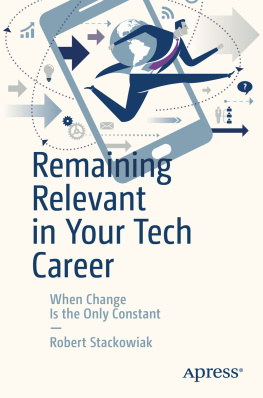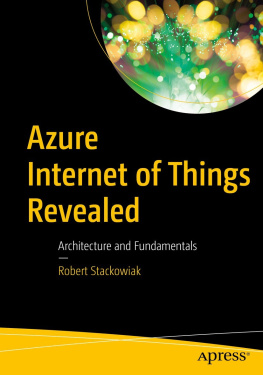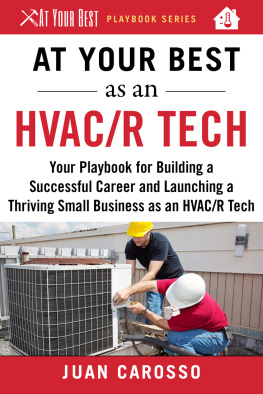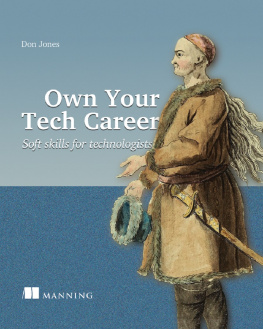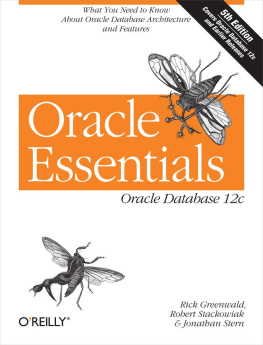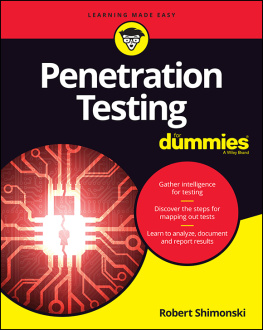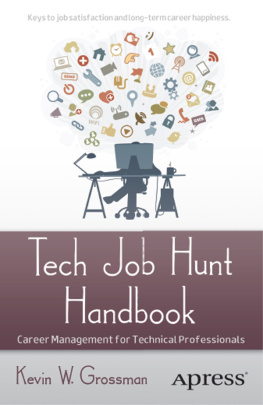Robert Stackowiak - Remaining Relevant in Your Tech Career
Here you can read online Robert Stackowiak - Remaining Relevant in Your Tech Career full text of the book (entire story) in english for free. Download pdf and epub, get meaning, cover and reviews about this ebook. publisher: Apress, genre: Business. Description of the work, (preface) as well as reviews are available. Best literature library LitArk.com created for fans of good reading and offers a wide selection of genres:
Romance novel
Science fiction
Adventure
Detective
Science
History
Home and family
Prose
Art
Politics
Computer
Non-fiction
Religion
Business
Children
Humor
Choose a favorite category and find really read worthwhile books. Enjoy immersion in the world of imagination, feel the emotions of the characters or learn something new for yourself, make an fascinating discovery.
- Book:Remaining Relevant in Your Tech Career
- Author:
- Publisher:Apress
- Genre:
- Rating:5 / 5
- Favourites:Add to favourites
- Your mark:
- 100
- 1
- 2
- 3
- 4
- 5
Remaining Relevant in Your Tech Career: summary, description and annotation
We offer to read an annotation, description, summary or preface (depends on what the author of the book "Remaining Relevant in Your Tech Career" wrote himself). If you haven't found the necessary information about the book — write in the comments, we will try to find it.
Remaining Relevant in Your Tech Career — read online for free the complete book (whole text) full work
Below is the text of the book, divided by pages. System saving the place of the last page read, allows you to conveniently read the book "Remaining Relevant in Your Tech Career" online for free, without having to search again every time where you left off. Put a bookmark, and you can go to the page where you finished reading at any time.
Font size:
Interval:
Bookmark:
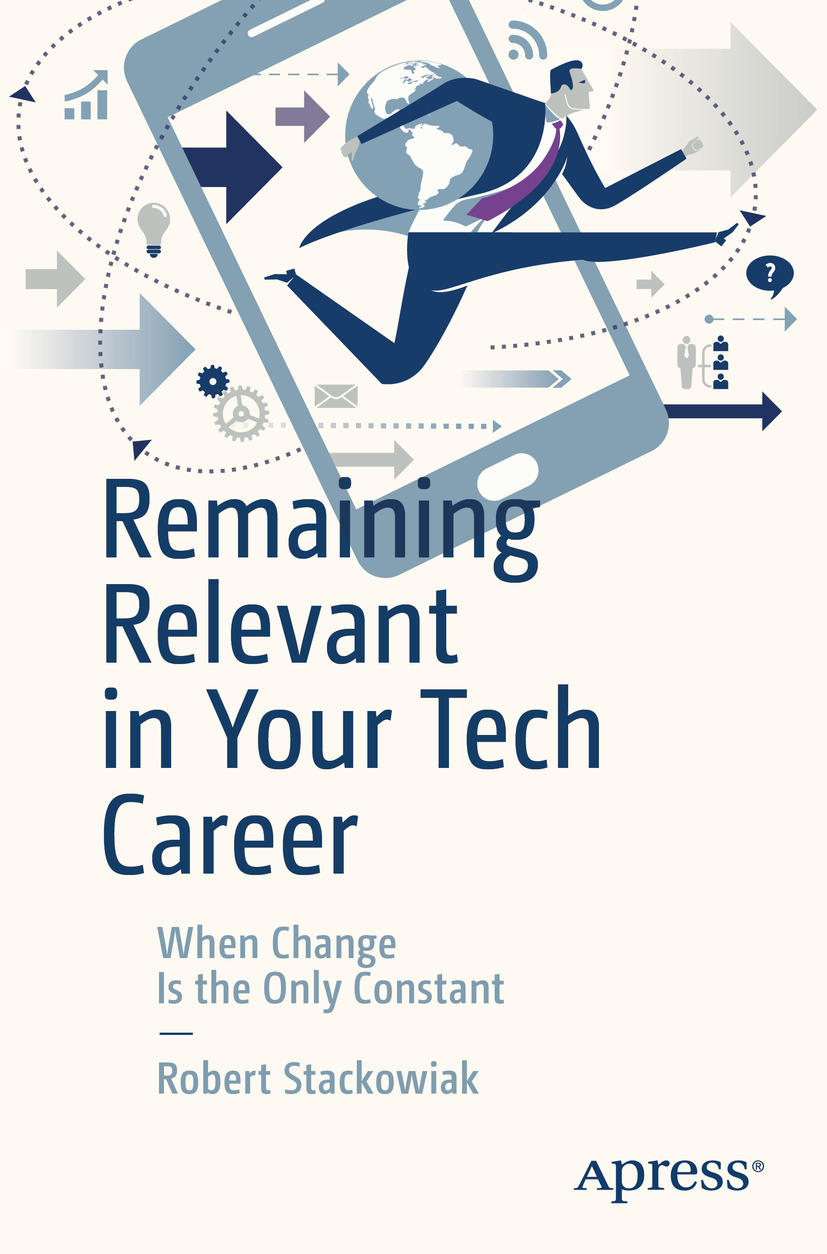

Any source code or other supplementary material referenced by the author in this book is available to readers on GitHub via the book's product page, located at www.apress.com/9781484237021 . For more detailed information, please visit http://www.apress.com/source-code .
This book is dedicated to my wife, Jodie, my life-long partner. Without her, my career journey and this book would not have been possible.
I have had the good fortune to work for about 40 years in technology-related roles. You might have picked up this book because you wonder how this is possible. I was reminded of attitudes that some possess about aging in such roles recently while riding my commuter train from work in the Chicago area. I overheard a conversation where one of the technology specialists said to his friend, "When you reach the age of 50, you should not be in information technology." Since I am well beyond the age of 50, it occurred to me that the position that I hold and the value that I still provide might be unexpected by some. Yet, I know there are many of you who continue to believe that you can make a positive impact in technology careers and that you have valuable experience that you can bring to new jobs as you age.
What companies and organizations want
The importance of business culture
Political considerations
Why diversity matters
Developing the right skills
How to own your future
I realize that some of you might believe that the rate of change in the future will accelerate and that lessons from the past might be of limited usefulness. However, rapid change is nothing new (as you are about to see as I describe my career path here). I believe that many of the lessons that I share in this book will therefore prove useful in the future.
I encountered a lot of changes in technology and what was expected of me over the years. My career path included jobs in the government and in commercial technology companies. I advised government agencies and small, medium-sized, large, and multi-national commercial companies in these roles, helping them define strategies and information technology architectures.
My undergraduate degree is in civil engineering and was obtained from the University of Notre Dame. In the 1970s, the computational tools that civil engineers used evolved from slide rules to electronic calculators and computers. Input into computers was most often by using punched cards. The engineering programming language of choice was Fortran. The experience with computing that I gained at Notre Dame started me in a direction I hadn't anticipated.
Upon graduation, I was hired by the U.S. Army Corps of Engineers to focus on hydraulic (water-related project) engineering. Being the young member of the team, they assigned me to projects that included technologies still in the process of being proven as useful. Survey data in the Chicago District was analyzed using software, and both software and data were loaded into a programmable calculator via magnetic cards. At the St. Paul District, I used Fortran-based software developed by the Corps' Hydraulic Engineering Center (in Davis, California) to analyze river flow and flooding and predict the impact of flood control projects. I was also trained on how to use finite element software for structural analysis and design.
The Corps was ahead of its time in many respects when I worked there from 1978 to 1986. They were early adopters of minicomputers (from Harris Corporation). Programming and input was possible through Texas Instruments terminals (with thermal paper to display input and output), Tektronix graphics displays, and later through CRT terminals and PCs. Lock and dam traffic data was captured on CPM-based PCs that were loaded with 8-inch floppy disks.
It was during this time that I made the transition from being a hydraulic engineer using computers to programming software to make my job easier. Later, I began writing code to provide software solutions for others. In 1982, I developed Habitat Evaluation Procedures (HEP) software in Fortran for the Harris computer under guidance from the Corps' headquarters in Washington, D.C. This software was used to report on the potential impact of projects on wildlife habitats.
About this time, the St. Paul District began exploring the value of AT&T 3B2 Unix-based computers and the C programming language. I attended training at AT&T in Santa Clara, California. Upon my return, we used the AT&T 3B2s that we had in St. Paul to set up networked e-mail among the engineers. I rewrote the HEP software in C. I also developed training and documentation for the engineers using these platforms and collaborated in development of critical path method (CPM) software for managing construction projects.
Font size:
Interval:
Bookmark:
Similar books «Remaining Relevant in Your Tech Career»
Look at similar books to Remaining Relevant in Your Tech Career. We have selected literature similar in name and meaning in the hope of providing readers with more options to find new, interesting, not yet read works.
Discussion, reviews of the book Remaining Relevant in Your Tech Career and just readers' own opinions. Leave your comments, write what you think about the work, its meaning or the main characters. Specify what exactly you liked and what you didn't like, and why you think so.

